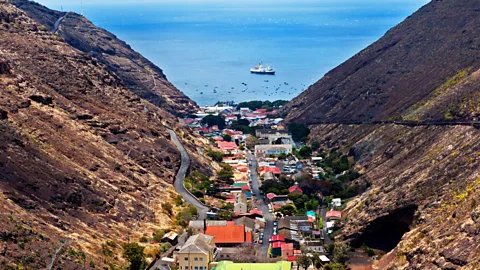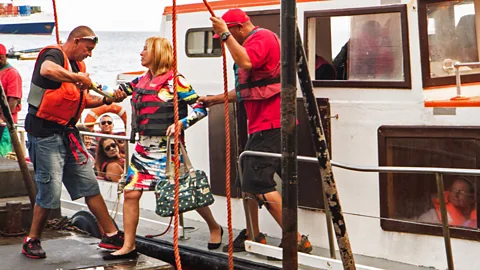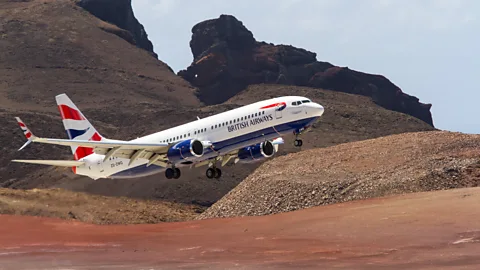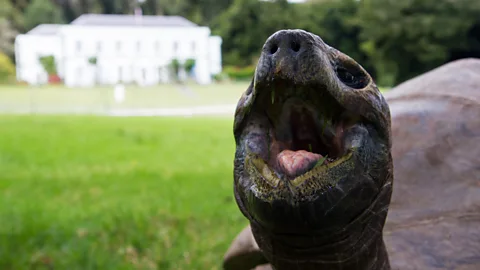The island ready to welcome the world
 Gillian Moore/Alamy
Gillian Moore/AlamyFor more than 500 years, the only way to reach the remote South Atlantic island of Saint Helena was by sea. That is about to change.
For more than 500 years, the only way to reach the British Overseas Territory of Saint Helena was by sea. Travelling to the South Atlantic island by sailboat, after a nine-day voyage from Namibia, my family and I made landfall the way every person before us has: the way Napoleon Bonaparte did when he was sent into exile in 1815; the way modern-day Saints (as the local population is known) do when they venture home from work in the UK; and the way the occasional, intrepid visitor has always done. But we were one of the last travellers to do so.
 Diane Selkirk/Evan Gatehouse
Diane Selkirk/Evan GatehouseIn April, the first commercial plane landed at the island’s new airport, and the last working Royal Mail Ship, the St Helena, was slated for decommissioning.
A dwindling population and defiant island geology – which, as Charles Darwin put it, “rises abruptly like a huge black castle from the ocean” – were long-time barriers to the development of an airport. But fears that the island could become nothing more than a remote old age home as younger Saints look elsewhere for employment finally forced the issue. Planned weekly flights will replace the monthly ship visits, and tourism is projected to take off.
Now, for the first time, visitors won’t risk being doused in the Atlantic swell when they reach for the ropes at the sea-washed Jamestown landing, trying to time their first step onto solid ground.
I, however, had expected the ropes at the landing – and even the strong arms of the Saints as they pulled me away from the swirling sea. I knew that the capital of Jamestown would be a crayon-coloured English village wedged improbably into a volcanic cleft on a tropical island. I’d read that Napoleon Bonaparte had been the island’s most famous prisoner.
 Gillian Moore/Alamy
Gillian Moore/AlamyBut knowing of a place and knowing a place are different things. Of all the islands I’ve visited, Saint Helena is the most wonderful and strange.
Did you know?
(Photo Credit: Ashley Toone/Alamy)
“What do you think a tortoise wishes for?” my daughter Maia asked me, after our guide Robert Peters told us about Jonathon. I had no idea, especially when Peters added: “Some say he already had a wish, so this might really be his second.”
 Diane Selkirk/Evan Gatehouse
Diane Selkirk/Evan GatehouseWe found Jonathon (along with the much younger David, Emma, Myrtle and Fredrika) on the lawn of the governor’s residence, Plantation House. Set in the rugged island’s surprisingly bucolic interior – which appears transplanted in its entirety, complete with charming parish churches, from the English countryside – Plantation House and Jonathon are just two of the 162-square-mile island’s eclectic highlights.
Others include spectacular hiking and diving, Edmond Halley’s 1677 observatory, a quarantine station and refugee camp for freed slaves, former Boer concentration camps, a smidgen of native jungle which was once catalogued by Charles Darwin, and – most oddly – 14 hectares of French territory that’s under the istration of the French Foreign Ministry, which includes Napoleon’s estate of Longwood House and the Valley of the Tomb, where he was originally interred before his body was returned to . There’s also the Bellstone, a popular curiosity during Saint Helena’s original tourism boom, before the Suez Canal opened, when more than 1,000 ships called each year.
At first glance, the Bellstone appeared to be a normal boulder – until struck with a rock. The melodious sound that followed made me want to whack every boulder I could find, just in case others sound like bells and no one but a Saint had ever thought to check.
One legend says the ringer of the Bellstone is granted a wish. I wondered if Jonathon’s own wish was related to the Bellstone, and made a mental note to ask Peters.
I spent the rest of the day exploring the island with Peters. Saint Helena is a place of improbable beauty: there are hiking trails cutting through multi-hued volcanic hills, old stone fortifications perched over bright blue seas, huge whale sharks in warm, gin-clear water and great granite spires rising out of pasture land.
 Diane Selkirk/Evan Gatehouse
Diane Selkirk/Evan GatehouseIt takes a while to adjust to the easy friendliness here. Smiles are ever present, introductions flow freely and car keys are left in unlocked cars, just in case. There’s also an old-world virtuousness that we took an almost comic delight in. The biggest crime that occurred during our visit was theft of a car mirror by a hairpin turn. We also heard some “rough boys” offended local sensibility when they didn’t wave at ing cars while driving down Ladder Hill. Greeting others is more than good manners here – it’s an inborn reflex.
However, much of my time was spent deciphering what a local friend assured me was a “proper Saint’s accent”. A linguistic mash-up of diverse cultures and histories – which began with the island’s Portuguese discoverers and includes African slaves, Europeans, British settlers, East India Company employees and indentured workers from South East Asia – the dialect adds and subtracts both syllables and letters, and sentences speed by at a dizzying rate. It took me several tries to understand that Jonathon’s wish was actually a wash. He’d been given a good scrub when visited by the vet – so he’d look handsome for the new governor, Lisa Phillips, when she arrived.
I felt strangely let down to discover that St Helena’s oldest resident hadn’t made a wish about his future. When not hissing or presenting you with his thighs to tickle, the ancient creature has seen Saint Helena transform from one of the world’s most important mid-ocean provisioning stops to an isolated and forgotten outpost, and then again into a community that’s once again ready to welcome the world.
I’d like to imagine that if Jonathon had been granted a wish, he’d hope that the isolation, which made Saint Helena unique and makes visiting so alluring, gives way gently to change. I think he’d wish for the Saints to keep marching to their own music as they welcome new visitors to their castle in the middle of the sea.
If you liked this story, sign up for the weekly bbc.com features newsletter, called “If You Only Read 6 Things This Week”. A handpicked selection of stories from BBC Future, Earth, Culture, Capital, Travel and Autos, delivered to your inbox every Friday.
